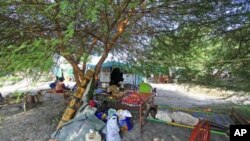The International Organization for Migration says a convoy of barges has transported 1,800 South Sudanese from Kosti, a town near Sudan's capital Khartoum, to the South Sudan capital of Juba. This is the fourth convoy of barges bringing South Sudanese who were living in the north to their newly-independent country. IOM says many thousands more are waiting for help to return to their homes of origin.
An estimated 350,000 Sudanese have returned from Sudan in the north to South Sudan, which became an independent country on July 9. They have either returned spontaneously or in an organized fashion.
IOM has helped about 7,000 South Sudanese to return since July 26. IOM spokesman Jean-Philippe Chauzy said most of the returnees are traveling on barges along the Nile River.
He says that his agency normally would not take the southerners on this lengthy river journey to Juba. He said it takes two to three weeks to complete the more than 1,400-kilometer trip.
“The reason we are using the Nile at the moment is because… there is insecurity in the border regions between north and south Sudan, and that has been ongoing," said Chauzy. "And secondly because we are looking at the rainy season, which means that traditional routes for return are now not usable. So, using the Nile is probably the most efficient way at the moment of returning people from Kosti to Juba.”
Safe passages
Chauzy said IOM is trying to make the journey down the Nile in the double-decker barges as comfortable and smooth as possible. He said there are doctors on board, as well as enough food and medical stocks to take care of everyone.
He said it is not clear what the people will do once they arrive in the South Sudanese capital, Juba.
“A lot of people will probably, or do probably stay in Juba, very simply because Juba is a place where jobs can be found. What we do know is that people who want to return to other parts of South Sudan will usually use traditional networks to get back to their areas of origin," said Chauzy. "That being said, one should not underestimate the difficulties again in providing some re-integration assistance to those South Sudanese that are returning to very rural areas of South Sudan.”
Uncertain futures
Chauzy noted that people are going back to remote areas that have weak infrastructure and lack development. He said these people will need a lot of outside assistance to help them earn a livelihood and make these returns sustainable.
The International Organization for Migration reports 11,000 Southerners remain at Kosti, and many thousands more are waiting in Khartoum for help to return. It says many of these people have been waiting for months and have run out of money.
It also says the IOM has received some money from the United Nations to pay for the return program. But, it says this money is only a fraction of what is needed to move all the southerners who want to leave Sudan before the 9-month interim period expires.
The Khartoum government has passed a law that changes the status of southerners residing in Sudan from citizens to foreigners. Southerners will be stripped of their citizenship rights on March 9 - nine months after South Sudan's declaration of independence.
Nearly 1,800 South Sudanese Return From North
- By Lisa Schlein












